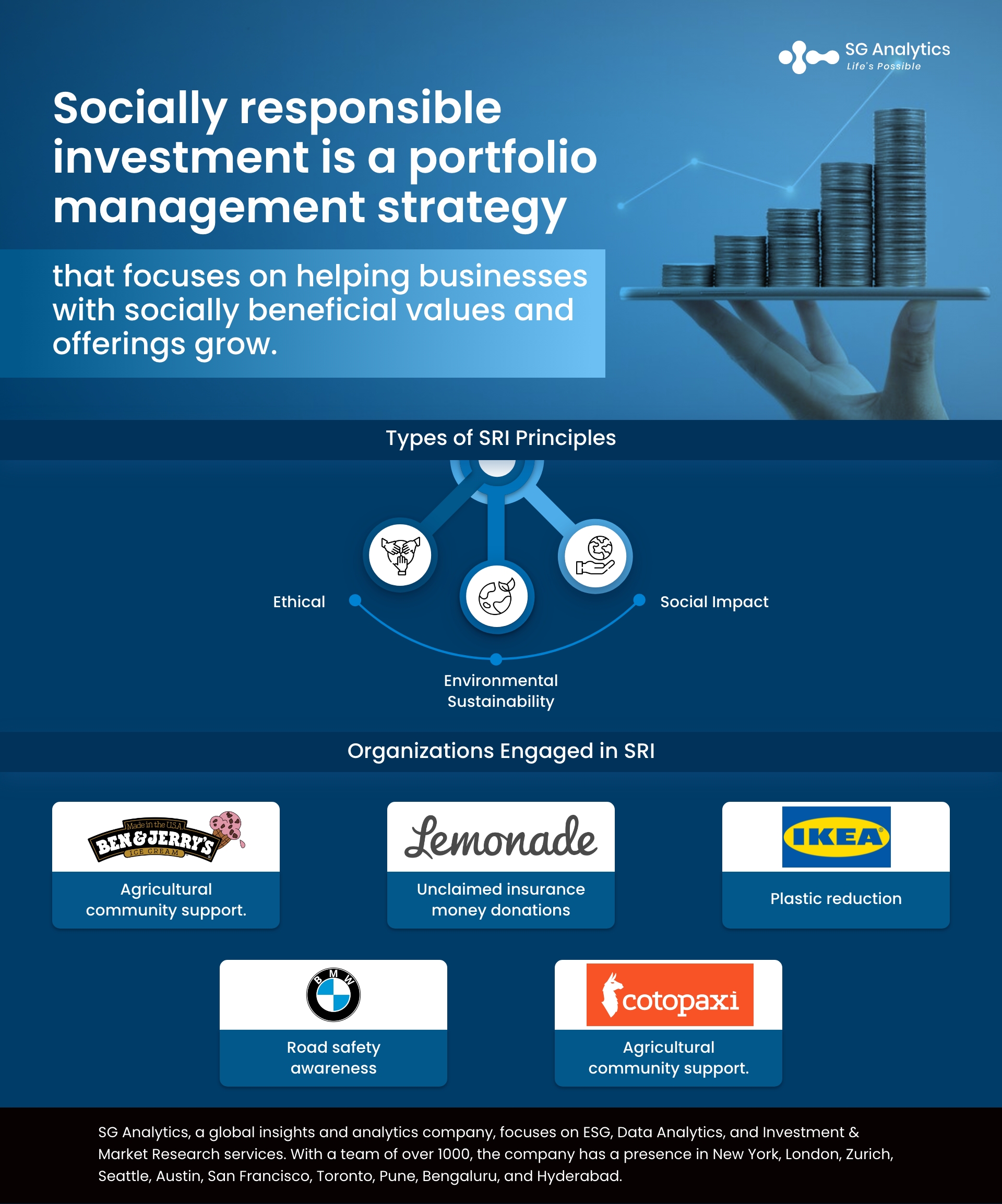Socially responsible investors support businesses that actively enhance their relationship with society through their operations, policies, products, and services. Investors believe companies must make a positive impact, embrace sustainable practices, and comply with governance requirements. This post will explore socially responsible investing that prioritizes social considerations across all investment decisions.
What is Socially Responsible Investing?
Socially responsible investment, or SRI, is a portfolio management strategy that focuses on helping businesses with socially beneficial values and offerings grow. It also makes investors refrain from engaging with potentially problematic enterprises.
Like ethical investing, SRI investing contributes to renewable energy, education, medicine, and infrastructure projects. Simultaneously, investors will divest from brands creating products that exhibit adverse health and productivity effects.
For instance, companies manufacturing weapons or generating significant carbon emissions will not get funding from SRI investors. However, a business like an e-learning platform provider or a pharma corporation will witness remarkable support.
Read Also: Ethical Investing – Concepts, Types, and Insights for Developing Portfolios
The Importance of Socially Responsible Investment (SRI)
First, according to the World Health Organization (WHO), air pollution is fatal to at least 7 million people each year. Therefore, manufacturing, raw material extraction, and construction businesses must do more to reduce their emissions by adopting green technologies in the market. And if investors can incentivize them to do so, they revise their business operations faster.
Secondly, the social investment approach empowers investors, entrepreneurs, administrators, and international bodies to increase their research and development (R&D) efforts. Indeed, SRI is essential because it outlines sustainable product innovation as a competitive advantage.

Lastly, the significance of socially responsible investment strategies is increasing as more stakeholders blur the line between moral compass and lifestyle choices.
For example, consumers want to purchase from eco-friendly companies. Likewise, many governments are willing to offer tax adjustments to organizations compliant with the EU taxonomy and having impressive environmental, social, and governance (ESG) ratings. So, the brands that modify their processes to embrace socially and environmentally conscious decision-making enjoy improved stakeholder relations.
What You Must Know About Socially Responsible Investing
Exploring and selecting socially responsible investment opportunities does not undermine financial materiality analyses, credit risks, legal due diligence, or return on investment (ROI) forecasting. After all, SRI values efficient and profitable companies like many other investing, stock screening, and valuation approaches.
So, investors augment their conventional investing attitudes with additional components like inspecting an organization’s ethical and social impact. Consider the following aspects to understand how SRI creates value while serving financial performance objectives.
A. What Are the Types of SRI Principles?
1. Ethical Principles
Religious concepts that explore morality, truthfulness, empathy, and a sense of belonging to a community affect investors’ attitudes. Besides, philosophies, political views, and a desire to improve civil society can inspire others to use SRI. They might also employ controversy analytics and track news sources while investing. Each investor will develop unique criteria to discern ethical and unethical brands.
2. Environmental Sustainability
Earth’s limited non-renewable resources will not last for the next generations. And this reality will exacerbate the socio-economic stability issues. So, a socially responsible investment will rely on corporate compliance data depicting each firm’s greenhouse gas (GHG) emissions and other sustainability concerns.
Related: How are Tech Leaders Powering Environmental Sustainability in Their Operations
3. Social Impact
Social impact investing in SRI principles evaluates whether a brand has improved customers’ health, made workplaces inclusive, and helped resolve pressing social challenges. For example, a company might celebrate multiple festivals to embrace cultural diversity. That positively affects the community.
And investors can gladly support businesses bringing together professionals from different countries, cultures, and faiths. They recognize a divided world threatens the global supply chain’s reliability, snowballing into living standards crises and causing public unrest sooner or later.
Likewise, if a company or its suppliers employ child labor, it adversely impacts society’s future. So, a sustainable and responsible investment manager will deliberately avoid such enterprises.

B. What is the Historical Background of SRI?
Socially responsible investing is much older than its modern iteration, having much to do with faith-promoting groups, civil rights movements, anti-war protests, and environmental preservation campaigns. Also, many thinkers, policymakers, philanthropists, journalists, academics, scientists, religious leaders, and non-governmental organizations (NGOs) helped to improve and promote social investment principles.
Read More: ESG and Impact Investing: The Future of Responsible Finance
For instance, John Wesley, an English evangelist from the eighteenth century, laid the foundation for avoiding “sinful” companies. His approach encouraged investors to interpret the religious principle of not harming a neighbor as not hurting the community or the environment for industrial projects. Identical ideas emerged in multiple territories, often relying on virtues and vices.
Civil war and labor rights activities provided new frontiers where businesses and investors had to be mindful of workers’ well-being. Combating discrimination and denouncing companies profiting from wars became integral to socially responsible investing. After all, consumers, as well as investors, sought meaningful changes, global peace, supply chain resilience, and socio-economic progress.
Today, climate emergency, privacy rights, transparency, data localization, and digital literacy are considerations joining the list of sustainable development requirements. Still, a universal framework is unavailable. As a result, there is a lack of global guidance on SRI investing and social impact assessment. So, investors must monitor multiple data sources for due diligence and risk analytics.
C. Who Are the Key Players and Organizations in the SRI Field?
1| Ben & Jerry’s
Ice cream, sorbet, and frozen yogurt are the core offerings that generate revenue for Ben & Jerry’s Homemade Holding Inc. A portion of it goes to their foundation focused on farming and dairy community projects.
2| Lemonade
Lemonade, a certified B insurance company, provided 1.8 million US dollars to charities like Pencil to Promise and those involved in breast cancer research. Social impact investment opportunities that focus on similar programs are popular. In this case, the Lemonade Giveback program donated the unclaimed money.
3| IKEA
IKEA focuses on wood, wool, and cotton, avoiding indecomposable plastic wherever feasible. Likewise, the IKEA Foundation works on creating long-term income streams for low-income families. Its socially responsible investing encompasses funding renewable energy, agriculture, entrepreneurship, and emergency response projects.
Read Also: Investing in Renewable Sector: Identifying the Top Renewable Energy Funds in 2023
4| BMW
BMW works on and invests in road safety awareness and engineers’ skill development projects. It wants to promote social mobility and inclusion while increasing awareness about accidents and reliable engineering measures.
5| Cotopaxi
Cotopaxi, an outdoor gear provider, allocates some of its revenue to poverty reduction through NGOs. It has received carbon-neutral certification. Besides, its SRI investing actions include giving 1% of sales to planet preservation causes.

Benefits of Socially Responsible Investing
A. Good Financial Returns of SRI
An excellent investment strategy allows investors to mitigate risks and increase their returns. Today, integrating social aspects is vital to strategy creation. Yet, a company might offer higher ROI than another without contributing more to social impact projects. Therefore, you want to examine a target firm’s financial prospects and social initiatives one at a time.
At the same time, specific enterprises with impressive ESG ratings and adequate carbon emissions control might excel in financial performance if sustainability compliance increases their efficiency. In such cases, responsible investing to support sustainable companies can offer extraordinary returns.
Related: Sustainability Outlook: Is ESG an Investment Strategy or a Path to Creating a Sustainable World?
1. About the Historical Performance of Some SRI Portfolios
Due to the conflict of interest, financial magazines and advisors promoting socially responsible investing are less likely to admit underperformance events. Thankfully, independent research papers and related scrutiny reveal that SRI portfolios are neither superior nor inferior to conventional investment strategies. For example, MSCI’s KLD 400 Social Index exhibited a 6.91% annualized gross returns rate till 2022.
B. Positive Impact on Society and the Nature
SRI investors encourage industry participation in key challenges like climate risks, financial accounting transparency, and inclusion. Several initiatives also address unemployment, poverty, and homelessness problems.
Some companies will spend a part of their revenue on public literacy, infrastructure development, healthcare research, and equipment upgrades aimed at energy conservation. Others might optimize their branded products and services to use less plastic and electricity.
Social impact is also related to training young individuals to promote industry-relevant skills and attitudes. Supporting the local community during natural calamities is another idea for companies and investors to make meaningful contributions to society.
C. Integrating Personal Values with Investment Strategies
Investors get to include their core beliefs in portfolio strategies, increasing satisfaction. If they dislike tobacco, alcohol, weapons, plastic, and meat, they can select the brands that do not operate in those industries. If they value literacy enhancement and malnutrition eradication, they will leverage SRI investing to screen and support the companies fighting for those causes.
Read Also: Connecting the Dots: Sustainability 2.0 & Green-Line Growth
How to Get Started with Socially Responsible Investing
Step 1: Determine Your Values and Priorities
Understanding which values matter the most to you is the key to crafting an effective SRI investing strategy. Remember, you can add or avoid the companies according to ethical, philosophical, environmental, or financial principles. However, targeting too many values will decrease the investment options you can choose from. So, focus on your top priorities.
Step 2: Finding Socially Responsible Investment Opportunities
You can practice social, sustainable, and value-driven impact investing by leveraging the following assets.
1. Stocks
Several asset managers help investors understand how different stocks perform on ESG, carbon emissions, and workplace safety metrics. While “green stocks” might initially seem attractive, you must conduct due diligence to overcome greenwashing risks.
2. Mutual funds and ETFs
iShares ESG Aware MSCI USA ETF is one reputed example of investments demonstrating the power of socially responsible investment funds. Likewise, specific exchange-traded funds (ETFs) focus on gender inclusivity, green technology, and renewable energy.
3. Green bonds
Green bonds address environmental issues, including recycling projects, water resource cleaning, solar power projects, electric vehicles (EVs), and pollution prevention.
Related: Inflation Reduction Act Likely to Boost US EV Industry
Step 3: Researching and Vetting SRI opportunities
Although socially beneficial projects deserve more funding, sustainable and responsible investing has an appropriate emphasis on financial factors. After all, if investors waste their capital on underperforming or greenwashed companies, they will have less capacity to empower authentic enterprises working in the field to embrace ESG and SRI principles.
You can source data from authoritative platforms, visualize critical trends, and gain insights into a company’s financial fundamentals. Furthermore, modern technologies that automate investment research, valuation, and ESG compliance auditing are available to help investors.

Conclusion
Philosophical schools of critical thought, an unwavering dedication to one’s religious values, or enthusiasm for democratizing technology education might make investors more willing to support a business. They can utilize socially responsible investment strategies to bring about lasting changes in the social, corporate governance, and ecological dynamics.
Governments, investors, managers, consumers, NGOs, and the life of Earth are the stakeholders that immensely benefit when firms become more transparent. And brands can prove their commitment to sustainable development goals (SDGs) to attract conscious patrons and clients.
Simultaneously, corporations preparing the required “social good” programs might become resilient to controversies and non-compliance fines. Yet, these virtuous gains do not translate to or justify financial underperformance. Instead, augmenting conventional investment research through ESG data, controversy analytics, and greenwashing risk analysis has become non-negotiable. With experienced analysts and researchers by your side, you can get impressive ROI from a social investment.
SG Analytics, recognized by the Financial Times as one of APAC's fastest-growing firms, is a prominent insights and analytics company specializing in data-centric research and contextual analytics. Operating globally across the US, UK, Poland, Switzerland, and India, we expertly guide data from inception to transform it into invaluable insights using our knowledge-driven ecosystem, results-focused solutions, and advanced technology platform. Our distinguished clientele, including Fortune 500 giants, attests to our mastery of harnessing data with purpose, merging content and context to overcome business challenges. With our Brand Promise of "Life's Possible," we consistently deliver enduring value, ensuring the utmost client delight.







